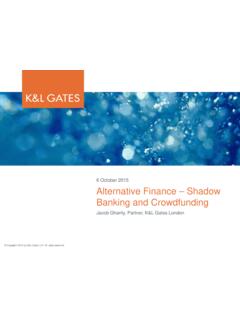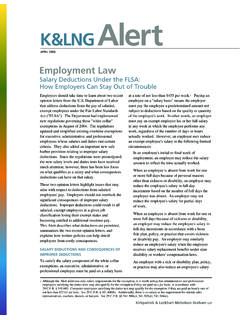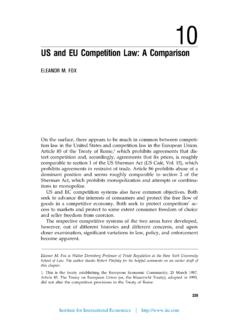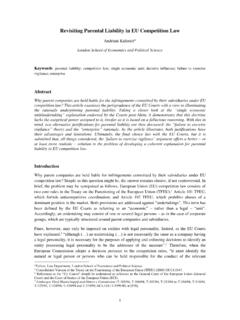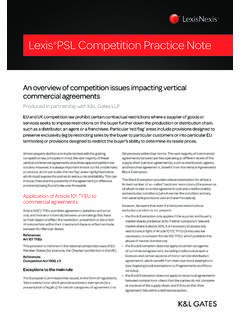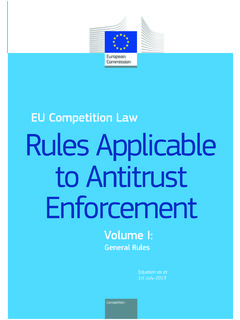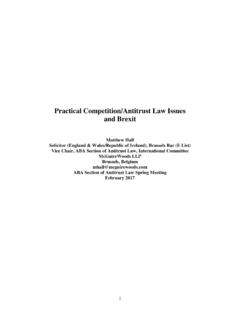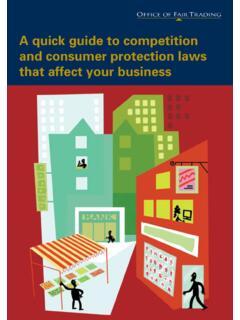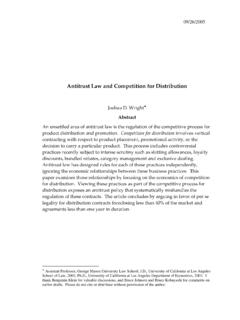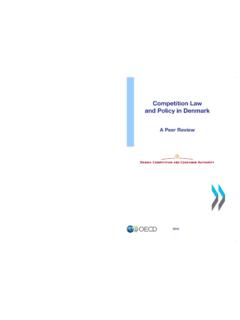Transcription of Lexis PSL Competition Practice Note - K&L Gates
1 Agency under EU Competition LawProduced in partnership with K&L Gates LLPT here are several ways in which a supplier can get its product to the market. A supplier may: distribute products or services itself use a distributor, or use an making this decision, a supplier will inevitably be influenced by a variety of commercial considerations. Alongside such commercial considerations, a supplier will also have to consider EU and/or national Competition law issues potentially impacting the proposed commercial arrangement. See further, An overview of Competition issues impacting vertical commercial are particular Competition law considerations to be taken into account depending on whether a supplier opts to use an agent or a distributor to get its products to the order to avoid infringing Article 101 TFEU (or equivalent local law rules), it is important to consider carefully whether the agreement would be regarded as a genuine agency agreement for the purposes of Competition law, taking into account all the facts and.
2 Article 101 TFEUW here an agreement is a genuine agency agreement, certain restrictions under Article 101(1) TFEU will not is because, as articulated in the seminal case of DaimlerChrysler AG, a genuine agent working for the benefit of his principal may in principle be treated as an auxiliary organ forming an integral part of the latter s undertaking, who must carry out his principal s instructions and thus, like a commercial employee, forms an economic unit with his undertaking .References: Case T-325/01 DaimlerChrysler AG v CommissionIn other words, the agreement is not an agreement between different undertakings for the purposes of Article 101(1) TFEU; the principal and agent are effectively regarded as one economic entit , the Vertical Guidelines make it clear that certain obligations, which would normally run the risk of breaching Article 101(1) TFEU, will fall outside of its scope where the relationship is one of genuine agency.
3 These restrictions are outlined under the section Potentially problematic provisions : Guidelines on Vertical Restraints, para 18By contrast, if the agent is in reality more akin to a distributor, certain provisions risk being regarded as prohibited hardcore restrictions or excluded restrictions of Competition , thus exposing the parties to Competition between an agent and distributorUnder the Vertical Guidelines:References: Commission Guidelines on Vertical Restraints, para 12An agent is a legal or physical person vested with the power to negotiate and/or conclude contracts on behalf of anoth-er person (the principal), either in the agent s own name or in the name of the principal, for the purchase of goods or services by the principal, or the sale of goods or services supplied by the agent should be distinguished from a distributor, which buys products from the supplier and then resells them to third parties in its own PSL Competition Practice NoteAgency under EU Competition LawAdvantages of agencyAgency can be attractive to both the principal and the agent for a number of advantages for the principal include that it.
4 Can retain greater control over the sale of the product, including specifying the price at which it is sold and where it is sold. As discussed further below, genuine agency agreements are subject to fewer Competition law risks and therefore permit greater restrictions on the agent can manage or increase its sales without the need to create new distribution systems or employ its own staff to get the goods or services to market, and creates a direct relationship between the supplier and the end customer, which may be important or valuable in terms of brand recognition, after-sales service advantages for the agent include that it: does not take on risk in relation to the product has no liability towards the customer in relation to the product usually requires substantially less investment (in particular fixed costs such as premises and marketing) compared with being a distributor, and when the agency concerns the sale of goods, will normally benefit from a right to compensation on termination under the Commercial Agents (Council Directive) Regulations may also be tax implications in deciding whether to use a distributor or will there be genuine agency?
5 An agreement will generally constitute a genuine agency agreement where: the property in the contract goods or services does not vest in the agent, or the agent does not himself supply the contract services, and the agent does not bear any, or bears only insignificant, commercial or financial risk in relation to the contract negotiated or concluded on behalf of the principal. Where the agent bears some risk, it is likely to be seen as acting independently rather than as an : Commission Guidelines on Vertical Restraints, para 13 The case law of the Court of Justice has made it clear that the requirement that agents not bear risk will be interpreted strictly, although in Practice it will be very difficult to determine the limits of what constitutes acceptable risk. While negligible financial and commercial risk will not preclude the possibility of genuine agency , what will amount to more than negligible risk will necessarily turn on the particular : Case C-279/06 CEPSA Estaciones de Servicio SA v LV Tobar e Hijos SLThe following guidance can be drawn from the case law: a genuine agent will act for the benefit of the principal, obey instructions and behave in the way an employee might actReferences: Case 40/73 Co peratieve Vereniging Suiker Unie UA and others v Commission an agent that bore the risk relating to the supplies (in that case, for fuel) from the moment of delivery and was obliged to pay the supplier principal for the deliveries within nine days of delivery, irrespective of whether the fuel had been sold, was found to bear too much risk to be a genuine agentReferences.
6 Case C-279/06 CEPSA Estaciones de Servicio SA v LV Tobar e Hijos SL an agent that had no authority to sell the principal s products (vehicles), but rather only to pass on orders to the principal, was held to be a genuine agent. In that case, there were strict guidelines for negotiating deals and the agreement of prices, and contracts were only concluded when the principal accepted the orderReferences: Case T-325/01 DaimlerChrysler AG v Commission in VAG Leasing, the Court of Justice considered it relevant to the assessment that the principal business and after-sales service [was] carried on, largely independently, in [the agent s] own name and for [its] own account . It concluded Agent DistributorDoes not buy the product from the supplier or take ownership of the productBuys the product from the supplier and thereby takes ownership of the productRepresents the principal and contracts on behalf of the principal (deals directly with both principal and customer)Represents itself and contracts on its own behalfHas no liability towards the customer in relation to the product (the principal retains risk and liability)
7 Takes on the product risk and is liable towards the customer in respect of the productIs normally paid a commission for its servicesNormally adds a margin to its resale price to make profit and cover expensesIs under fiduciary duties to act in the best interests of the principalDoes not owe fiduciary duties to the supplierMay have a right to compensation on termination under the Commercial Agents (Council Directive) Regulations 1993 (and equivalent regulations in other Member States)Normally has no statutory right to compensation, however check local law (eg distributors in Belgium and France benefit from equivalent protection)Agency under EU Competition Lawthat the agent was not a genuine agent for the purposes of Competition law. However, it now appears from the definition of agency in the Vertical Guidelines that an agreement need not necessarily be made in the name of the principal to be regarded as a genuine agency.
8 This re-emphasises that it is the economic reality that will determine whether a genuine agency relationship exists as opposed to the legal form of contracts concluded by the : Case C-266/93 Bundeskartellamt v Volkswagen AG and VAG Leasing Commission Guidelines on Vertical Restraints, para 12 situation where the agent works for several principals. The Vertical Guidelines make clear that it is not material to the assessment of genuine agency if the agent acts for more than one prin-cipal. This is in contradiction to earlier decided case law, such as Vlaamse Reisbureaus, which concerned travel agents. In this case, the Court of Justice determined that a travel agent sells travel packages organised by a large number of different tour operators and that a tour operator sells its tours through a large number of travel agents. For this reason, the Court decided that there could be no agency relationship, stating that a genuine agent works only on behalf of one principal.
9 This case has been heavily criticised and it appears from the more recent Vertical Guidelines that an agent need not be an exclusive agent in order for there to be a genuine agency : Commission Guidelines on Vertical Restraints, para 14 Case 311/85 VZW Vereniging van Vlaamse Reisbureaus v VZW Sociale Dienst van de Plaatselijke en Gewestelijke OverheidsdienstenA step by step guide on identifying riskThe question of risk for the agent must be assessed on a case-by-case basis, taking into account the economic reality of the situation. The Vertical Guidelines state that the purported legal form of the contract is irrelevant to this : Commission Guidelines on Vertical Restraints, para 19A practical method of assessing whether an agent could be seen as bearing risk is to ask the questions set out in the steps below, which reflect the non-exhaustive principles laid down in the Vertical 1 can any contract-specific risks be established?
10 Contract-specific risks are those risks which are directly related to the contracts concluded or negotiated by the agent on behalf of the of contract-specific risks include where the agent: contributes to the costs relating to the supply or purchase of the products or services (including transportation costs) maintains (at his own cost or risk) stocks of the contract products undertakes responsibility towards third parties for damage caused by the products (unless in relation to the agent s own fault) takes responsibility for a customer s non-performance of the contract (unless in relation to the agent s own fault), or is obliged to invest in sales promotions, such as to contribute to the advertising budget of the decided case law of the Court of Justice of the European Union, where an agent bears even one contract-specific risk, there will be no genuine agency (see VAG Leasing).


